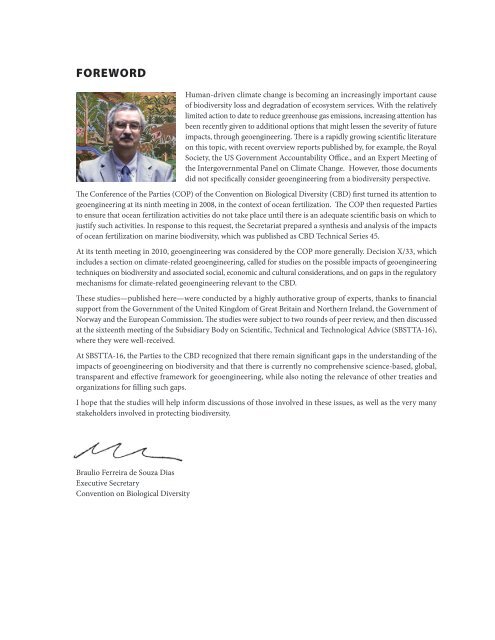cbd-ts-66-en
cbd-ts-66-en
cbd-ts-66-en
Create successful ePaper yourself
Turn your PDF publications into a flip-book with our unique Google optimized e-Paper software.
FOREWORD<br />
Human-driv<strong>en</strong> climate change is becoming an increasingly important cause<br />
of biodiversity loss and degradation of ecosystem services. With the relatively<br />
limited action to date to reduce gre<strong>en</strong>house gas emissions, increasing att<strong>en</strong>tion has<br />
be<strong>en</strong> rec<strong>en</strong>tly giv<strong>en</strong> to additional options that might less<strong>en</strong> the severity of future<br />
impac<strong>ts</strong>, through geo<strong>en</strong>gineering. There is a rapidly growing sci<strong>en</strong>tific literature<br />
on this topic, with rec<strong>en</strong>t overview repor<strong>ts</strong> published by, for example, the Royal<br />
Society, the US Governm<strong>en</strong>t Accountability Office., and an Expert Meeting of<br />
the Intergovernm<strong>en</strong>tal Panel on Climate Change. However, those docum<strong>en</strong><strong>ts</strong><br />
did not specifically consider geo<strong>en</strong>gineering from a biodiversity perspective.<br />
The Confer<strong>en</strong>ce of the Parties (COP) of the Conv<strong>en</strong>tion on Biological Diversity (CBD) first turned i<strong>ts</strong> att<strong>en</strong>tion to<br />
geo<strong>en</strong>gineering at i<strong>ts</strong> ninth meeting in 2008, in the context of ocean fertilization. The COP th<strong>en</strong> requested Parties<br />
to <strong>en</strong>sure that ocean fertilization activities do not take place until there is an adequate sci<strong>en</strong>tific basis on which to<br />
justify such activities. In response to this request, the Secretariat prepared a synthesis and analysis of the impac<strong>ts</strong><br />
of ocean fertilization on marine biodiversity, which was published as CBD Technical Series 45.<br />
At i<strong>ts</strong> t<strong>en</strong>th meeting in 2010, geo<strong>en</strong>gineering was considered by the COP more g<strong>en</strong>erally. Decision X/33, which<br />
includes a section on climate-related geo<strong>en</strong>gineering, called for studies on the possible impac<strong>ts</strong> of geo<strong>en</strong>gineering<br />
techniques on biodiversity and associated social, economic and cultural considerations, and on gaps in the regulatory<br />
mechanisms for climate-related geo<strong>en</strong>gineering relevant to the CBD.<br />
These studies—published here—were conducted by a highly authorative group of exper<strong>ts</strong>, thanks to financial<br />
support from the Governm<strong>en</strong>t of the United Kingdom of Great Britain and Northern Ireland, the Governm<strong>en</strong>t of<br />
Norway and the European Commission. The studies were subject to two rounds of peer review, and th<strong>en</strong> discussed<br />
at the sixte<strong>en</strong>th meeting of the Subsidiary Body on Sci<strong>en</strong>tific, Technical and Technological Advice (SBSTTA-16),<br />
where they were well-received.<br />
At SBSTTA-16, the Parties to the CBD recognized that there remain significant gaps in the understanding of the<br />
impac<strong>ts</strong> of geo<strong>en</strong>gineering on biodiversity and that there is curr<strong>en</strong>tly no compreh<strong>en</strong>sive sci<strong>en</strong>ce-based, global,<br />
transpar<strong>en</strong>t and effective framework for geo<strong>en</strong>gineering, while also noting the relevance of other treaties and<br />
organizations for filling such gaps.<br />
I hope that the studies will help inform discussions of those involved in these issues, as well as the very many<br />
stakeholders involved in protecting biodiversity.<br />
Braulio Ferreira de Souza Dias<br />
Executive Secretary<br />
Conv<strong>en</strong>tion on Biological Diversity


